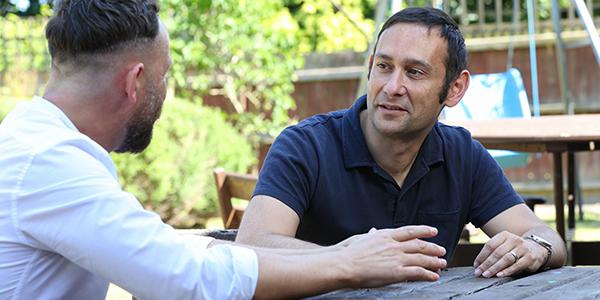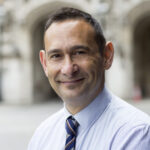Identity – and why I’m determined to tackle all forms of racism
Richard, our chief executive, discusses his identity and how his experiences drive him to dismantle racism.

Last week, a report was published that highlighted the lack of diversity at the top of the 50 leading charities in the country. Sense is one of those charities and I have spoken before about the need for the sector to address this, and I am determined to address it head-on at Sense.
As part of the report I was surveyed, an experience I found problematic, and it made me reflect on my own identity and how the way in which people perceive me has shaped how I see myself.
The survey asked if I classify as ‘White or BAME’? The survey explained: “For the sake of simplicity, when it comes to ethnicity we are only asking if people consider themselves to be white or BAME (Black, Asian, and Minority Ethnic), a broadly accepted umbrella term for people who come from minority backgrounds.”
This simple survey, that sought binary classification in relation to how I define myself, threw up many questions.
I am Jewish. People may perceive me as being white, but that’s not how I identify. Some Jewish people may identify as BAME, but I don’t.
I had to make a special request for the survey to classify me as ‘Other’, an option that wasn’t originally available. I worried they may perceive me as being difficult.
The survey reminded me that all too often, I feel like an outsider. It gave me flashbacks of some of the trauma I experienced growing up, as I struggled with my Jewish identity and where I fit in, if at all.
Until now, indeed this article, I generally don’t tell people that I am Jewish. My Jewish identity until recently, has been bound up with years of much shame, guilt and stigma for me.
Identity struggles growing up
When growing up at school, I was regularly called both ‘paki’ and ‘yid’ and spat on and bullied on a regular basis. Ashamed of my darker complexion (feeling neither white or BAME), I felt that I didn’t belong at all. As a child, I used to rub an abrasive kitchen sponge hard on my face for hours and hours until my face was red raw, hoping to scrape off my darker complexion. I wanted to fit in and be accepted as a white person.
As a young adult, I was always asked about my complexion: ‘Where are you from?’, ‘Why are you so dark?’ etc. I rarely, if ever, said that I was Jewish, rationalising to myself that not all Jewish people had dark complexions or were religious, fooling myself that I really wasn’t dodging the question at all.
Onto my twenties and early thirties, I remember an acquaintance telling me that you should always let people know you are Jewish. Don’t be ashamed. I had a short period of blurting out ‘I’m Jewish’, somewhat randomly before people could complete their tentative enquiries about the colour of my skin, overcompensating for 20 years of previous vowed silence.
Responses were varied – sometimes warmth: ‘That’s really interesting, I’ve never met a Jewish person before’- sometimes political: ‘What do you think of the Israeli government,’ (I am talking about my race, not government – but you are not allowed to talk about one without the other), sometimes negative: ‘Oh my family used to work with Jewish people and didn’t like them’. I said nothing. Was I desensitised to harmful comments and biases as they have become so normalised in everyday life. Too ashamed, was I still a Jewish person who looked the other way?
Skewed narratives about being Jewish with weaponised attacks on the term Zionist. Conversations and jokes about Jewish stereotyping, something I thought was binned in the 1970s with programmes like ‘Mind your Language.’ Comments made to me about typical Jewish men with a ‘big noses, you know the sort, typically rich and mean’, ‘gassing Jews in ovens’. Then those same people saying back to me ‘only joking’ ‘you are not offended’ are you?’. Antisemitic tropes on social media that have awaked in me the need, and indeed, an imperative that I speak out about antisemitism. The most recent and shameful example from the grime artist, Wiley.
Hostile environment towards minorities
In recent years the environment has become more hostile to all minorities including Jewish people. Both overt and covert racism. The world has turned inward and attitudes appear more spiteful. Like so many others, I have watched the last period with horror. Seeing Jewish people being viewed as a problem, first and foremost; watching subtle marginalisation and ‘othering’ – Jewish people not seen to be human, or part of society.
In these darkest periods, I have begun to yearn for the company of Jewish people, to feel safe rather than uncomfortably challenged.
I am Jewish. Being Jewish is an inherent part of my race and ethnic identity. I am no longer the child who rubbed his face with a kitchen brush to try and make his face lighter. I will try and be more upfront about my religion and identity.
I wont now be a Jewish person who looks the other way. I cant. We know that antisemitism existed long before the Holocaust and long after too. Jewish oppression is still alive and on the rise.
I will challenge cases of antisemitism. It is my responsibility to challenge the narrative and set my own agenda, not accept the prejudice of others. I have a responsibility to encourage more people to be allies and help the Jewish community.
We know the Jewish Community in the UK is one of the smallest minority communities in the UK. I am from a minority background. But looking again at the survey, I don’t identify myself as either white or from the BAME community.
I am not white. I do have the privileges afforded to white men. But there is a long and vicious history of antisemitism. I am not part of the BAME community. But I am also painfully aware of structural discrimination, of inequalities because of the colour of your skin, of structural disadvantage that this brings in the workplace and society.
As a Chief Executive of a charity, I am privileged. I will use my related experiences and my position of authority to act, to do things, to tackle all forms of racism, and with my colleagues at Sense, begin the long haul of dismantling racism at Sense.

